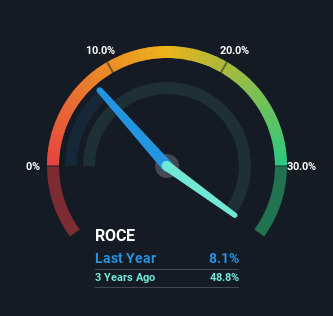- Hong Kong
- /
- Specialty Stores
- /
- SEHK:9992
Pop Mart International Group (HKG:9992) Is Reinvesting At Lower Rates Of Return

Did you know there are some financial metrics that can provide clues of a potential multi-bagger? Firstly, we'd want to identify a growing return on capital employed (ROCE) and then alongside that, an ever-increasing base of capital employed. If you see this, it typically means it's a company with a great business model and plenty of profitable reinvestment opportunities. However, after investigating Pop Mart International Group (HKG:9992), we don't think it's current trends fit the mold of a multi-bagger.
Understanding Return On Capital Employed (ROCE)
If you haven't worked with ROCE before, it measures the 'return' (pre-tax profit) a company generates from capital employed in its business. Analysts use this formula to calculate it for Pop Mart International Group:
Return on Capital Employed = Earnings Before Interest and Tax (EBIT) ÷ (Total Assets - Current Liabilities)
0.081 = CN¥622m ÷ (CN¥9.1b - CN¥1.3b) (Based on the trailing twelve months to June 2023).
So, Pop Mart International Group has an ROCE of 8.1%. In absolute terms, that's a low return but it's around the Specialty Retail industry average of 9.9%.
Check out our latest analysis for Pop Mart International Group

In the above chart we have measured Pop Mart International Group's prior ROCE against its prior performance, but the future is arguably more important. If you'd like, you can check out the forecasts from the analysts covering Pop Mart International Group for free.
What Does the ROCE Trend For Pop Mart International Group Tell Us?
When we looked at the ROCE trend at Pop Mart International Group, we didn't gain much confidence. To be more specific, ROCE has fallen from 39% over the last five years. Meanwhile, the business is utilizing more capital but this hasn't moved the needle much in terms of sales in the past 12 months, so this could reflect longer term investments. It's worth keeping an eye on the company's earnings from here on to see if these investments do end up contributing to the bottom line.
On a related note, Pop Mart International Group has decreased its current liabilities to 15% of total assets. So we could link some of this to the decrease in ROCE. Effectively this means their suppliers or short-term creditors are funding less of the business, which reduces some elements of risk. Since the business is basically funding more of its operations with it's own money, you could argue this has made the business less efficient at generating ROCE.
The Bottom Line
Bringing it all together, while we're somewhat encouraged by Pop Mart International Group's reinvestment in its own business, we're aware that returns are shrinking. Moreover, since the stock has crumbled 77% over the last three years, it appears investors are expecting the worst. On the whole, we aren't too inspired by the underlying trends and we think there may be better chances of finding a multi-bagger elsewhere.
If you're still interested in Pop Mart International Group it's worth checking out our FREE intrinsic value approximation for 9992 to see if it's trading at an attractive price in other respects.
While Pop Mart International Group may not currently earn the highest returns, we've compiled a list of companies that currently earn more than 25% return on equity. Check out this free list here.
New: Manage All Your Stock Portfolios in One Place
We've created the ultimate portfolio companion for stock investors, and it's free.
• Connect an unlimited number of Portfolios and see your total in one currency
• Be alerted to new Warning Signs or Risks via email or mobile
• Track the Fair Value of your stocks
Have feedback on this article? Concerned about the content? Get in touch with us directly. Alternatively, email editorial-team (at) simplywallst.com.
This article by Simply Wall St is general in nature. We provide commentary based on historical data and analyst forecasts only using an unbiased methodology and our articles are not intended to be financial advice. It does not constitute a recommendation to buy or sell any stock, and does not take account of your objectives, or your financial situation. We aim to bring you long-term focused analysis driven by fundamental data. Note that our analysis may not factor in the latest price-sensitive company announcements or qualitative material. Simply Wall St has no position in any stocks mentioned.
About SEHK:9992
Pop Mart International Group
An investment holding company, engages in the design, development, and sale of pop toys in the People’s Republic of China and internationally.
Exceptional growth potential with flawless balance sheet.


